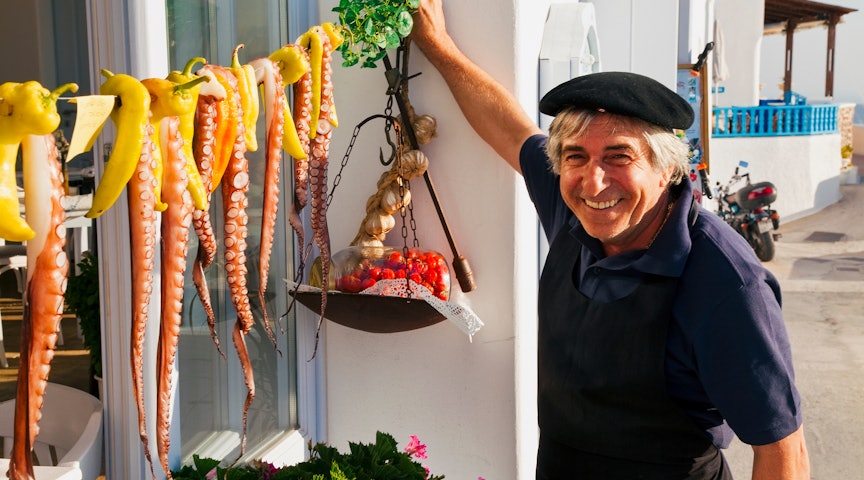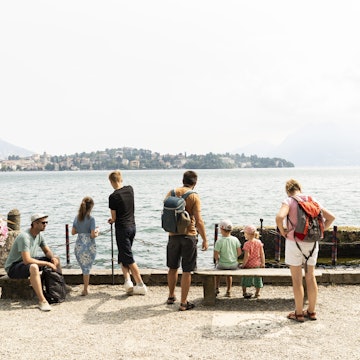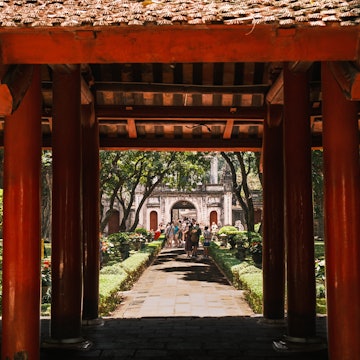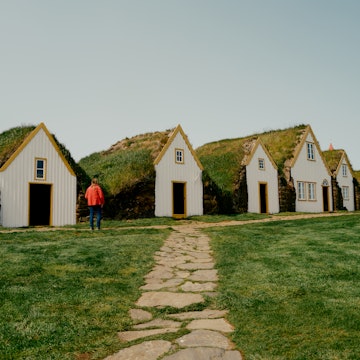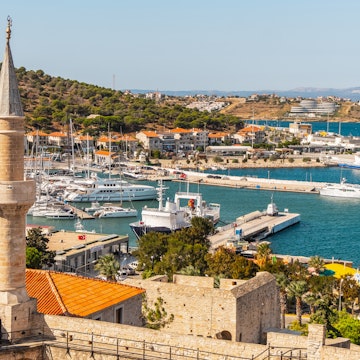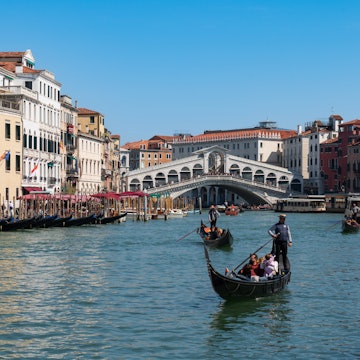
We swapped our homes for life at sea: the families living on the Mediterranean
Aug 18, 2020 • 8 min read

Alan's boat kids with friends at sea in the Mediterranean © Alan Wood
Rowan is fourteen and doesn’t go to school. She sleeps in a bedroom/corridor 1.40m x 2m and has never visited a hairdresser. Her two brothers share a triangular shaped room touching toes, and weeks go by without any of them putting on a pair of shoes, let alone a school uniform. These are boat kids, part of a dwindling community of families traveling the world by sea.
Two weeks ago, our sailboat neighbors included an Argentinian family anchored off the west coast of Formentera. Like us, they have been full-time liveaboards for three years, but having only one daughter of 12, are even more determined to hook up with other elusive boat families. More recently our sailboat neighbors included a German and Swiss family anchored off the south coast of Ibiza who have since, regrettably returned to land. Yesterday we sailed overnight and are now anchored off the coast of Mallorca catching up with the crew of S/Y Naos, a Russian family from Siberia. They have just completed their first year as liveaboards on a ferro-cement sailboat. Yes, boats can actually be made from cement!
We first met S/Y Naos in Almería at the beginning of the year. Like us, their circumnavigation was brought to an abrupt halt by the COVID-19 pandemic. The Spanish lockdown swiftly came into effect while we were preparing our boats for an Atlantic crossing and the boatyard we were using was forced to close. We were isolated, high and dry on props for seven long weeks without sanitation. The extended state of emergency meant we could only leave the boat for food, so we were forced to make covert trips down the ladder and across the yard to the toilet block, which was illicitly unlocked, maintained and sanitised by a maverick cleaner. And this is how we came to know Dan, Xenia and their three kids. They too were making furtive dashes across the yard to the toilet block surreptitiously avoiding the regular patrols by the Guardia Civil. It’s amazing how close bonds can form in times of desperation – literally.

By the time the state of emergency was lifted, the hurricane season had begun in the Atlantic and so began our six month hangout in the western Mediterranean with a handful of other families, waiting for the next transatlantic weather window.
Dan, was a mechanic in Siberia before embarking on this nomadic life. Xenia is a programmer who still works remotely when she can find the time in between mothering their three boys aged one, 10 and 15. This evening, however, she is sat on the foredeck of their boat nursing her youngest while hand stitching a significant rip in the mainsail. Dan is ruminating over a worryingly large hole that has recently appeared in the rudder. Earlier we both inspected an oil leak in our own engine and diagnosed a crankshaft seal problem. The old sailing cliché applies, that cruising life is just fixing boats in exotic locations. Sharing maintenance tips and advice is the epoxy resin of many a boat friendship.

Tonight, they’re coming for dinner and a playdate in a dinghy they retrieved from a boat yard skip. All that was needed were a few patches to bring it back to life, a lucky find that would have cost them €4000 if bought new. Another pithy aphorism that rings true amongst liveaboards is that one person’s trash is another person’s treasure.
It’s difficult to gauge the exact number of current liveaboard families because of their remoteness and isolation, but it’s estimated that at the beginning of 2020 the Mediterranean was home to perhaps 20–30. This number has since fallen sharply as the fallout from the pandemic has left many without a sustainable income. If cruising life really is about fixing boats, then sustaining it is about careful budgeting... and pandemics really don’t help.
While those on board S/Y Naos work remotely and occasionally pick up mechanical work when they can, we survive on a budget of around $1700/month (£1300) by renting our home in the UK and a trickle of YouTube advertising revenue. Boat families are as diverse as land families when it comes to wealth and income. Boat prices can range from a sub $13,000 (£10,000) doer-upper, to a blank-cheque-booker. But as many a long-in-the-tooth sailor knows, it’s not really about what you earn, it’s about what you don’t spend.
Like most liveaboards, we save money by avoiding marinas in high season, create power and water from solar energy and do our own maintenance, a grossly underestimated expense on which many a sailing dream flounders. New clothes are a luxury (not that you need many!) and hairdresser visits involve a quick trip to the back of the boat with the hair clippers and kitchen scissors. We wash dishes in sea water and only venture ashore to recycle, buy essentials or do inland trips and hikes – we do love a good hike. Other than that, we mostly live "on the hook".

This transient, barefoot life dream began as a pact between Irenka and I when we first met working as flotilla skippers in Greece and Croatia. Admittedly, an unplanned pregnancy isn’t the best thing on which to base a long-term relationship or life dream, but we cemented our combined futures by promising that one day, no matter what, we’d circumnavigate the globe together. Three kids, several unsuccessful businesses start-ups, a handful of home renovations and a $235 (£180) wedding later, that dream (and budget!) became a reality, albeit ten years later than anticipated.
We have weathered lightning storms at sea, attacks by dogs on land and been stung by numerous jelly fish in between. Irenka, even lost her hair for several months to some mysterious illness. So, it hasn’t all been plain sailing. But while to some, this autonomous, precarious and unstructured lifestyle may seem indulgent and irresponsible, for boat parents it is borne of a deep desire to share a life of discovery, travel and adventure with their kids.
Until recently, we received our fair share of criticism for removing our kids from mainstream education and conventional social structures. It is, after all, social distancing in the extreme. There are no team sports at sea, no trips to the mall with friends or regular family meet ups, things that have quickly become the "new normal" for wider society now. However, we have the advantage of living a lifestyle that breeds resilience, collaboration, communication and resourcefulness, characteristics that can’t easily be taught in a classroom and are sorely lacking in current graduates, according to numerous business surveys. It seems that travel not only broadens kids’ minds but can increase their employment desirability too.

Rowan, is academically self-motivated and largely self-taught, spending several hours a day studying for seven IGCSEs and has ambitions to crew on superyachts or join the Royal Navy. Her younger brothers, prefer snorkelling and doing backflips off the rigging, so homeschooling is a struggle at times. But all three play instruments and sometimes even compose music for our family’s sailing blogs. They speak basic Spanish, are very socially confident and physically active. With no dedicated games consoles onboard, our eldest son has taken to program his own PC games. Their friends are drawn mostly from a multinational scattering of other traveling families from around the world who are similarly remote and homeschooled. Some are sailing by sea while others are traveling overland. While many parents lament the incursion of social media into family life, it is a boon to traveling kids who, like us parents, use it to stay in touch, arrange meetups and bond through online forums.
Our travels have so far taken us back and forth across the Mediterranean, to ancient sites on the Turkey/Syria border, erupting volcanoes off the coast of Sardinia and skiing in the Spanish and Greek mountains. Yes, Greece and Spain have very reasonably priced ski slopes! Even after three years exploring the Mediterranean there is still so much we haven’t seen. However, we are itching to see other parts of the world and meet up with the rest of our sailing community.

The next part of our journey involves a month-long sail through the Canary Islands, down the West African coast to Cape Verde, and over to the Caribbean. After that we plan to transit the Panama Canal, into the South Pacific and beyond.
But who knows how many families will still be out there by the time we get to those far flung places? Will a parochial concept of "stranger danger" brought on by the coronavirus become so deep-rooted in our global psyche, that borders will be closed to us? Will transient lifestyles be looked upon with suspicion? Or will the recent acceptance of remote working coupled with a rejection of high density living/working environments result in a focus on the important things in life and revitalize our community as more families choose to sell up and sail away? I do hope so.
If that’s the case, come on in. The water’s lovely.
Follow Alan and family's adventures on their dedicated youtube channel.
You might also like:
10 classic sailing adventures
“How the hell can I do 100 days of this?” – 5 self-isolation tips from a solo circumnavigating sailor
A Croatian sailing adventure: the best spots to drop anchor in the Central Adriatic
Take your Greece trip with Lonely Planet Journeys
Time to book that trip to Greece
Lonely Planet Journeys takes you there with fully customizable trips to top destinations – all crafted by our local experts.
